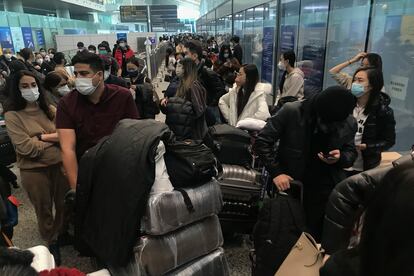United States to impose Covid-19 restrictions on travelers arriving from China
On guidance from the CDC and amid concern over Beijing’s management of a new coronavirus outbreak, negative tests will be required at US airports from January


A surge in coronavirus infections in China following Beijing’s decision to do away with a raft of strict and hugely unpopular measures under its zero-Covid policy has set alarm bells ringing worldwide. In response to China lifting a travel ban on its citizens, several countries have tightened entry requirements for visitors from the country. The latest to do so is the United States, where travelers from China will require a negative Covid-19 PCR test to be granted entry. The Joe Biden administration announced the measure on Wednesday and it will come into effect as of January 5.
The testing requirement will apply to all passengers two years and older arriving in the US from China, Hong Kong and Macau, regardless of their nationality or vaccination status. The requirement to present a negative test result, whether it be via a PCR or an antigen test taken no more than two days before departure, will also be applied to passengers who enter the United States through a third country transit, or who are using a US airport to connect to another destination. US authorities have set January 5 as the date the new requirements will come into force to allow airlines time to adjust to the measures.
The new restriction was imposed under guidance from the Centers for Disease Control and Prevention (CDC). As well as a huge spike in cases in China, there is concern in Washington over Beijing’s “lack of transparency” over the full extent of the latest wave. Although China’s National Health Commission put the number of new cases at a little over 4,000 for the entire country last Sunday, local authorities in Zhejiang and Qingdao, with a combined population of around 75 million, reported closer to one million and 500,000 daily cases respectively over the same timeframe.
US authorities are wary over the official figures provided by the NHC – which stated that it will stop providing daily statistical updates in the near future – and also over the information provided over the dominant strain driving the avalanche of infections. Citing a “lack of adequate and transparent epidemiological and viral genomic sequence data being reported from the PRC,” the CDC noted that such data is “critical to monitor the case surge effectively and decrease the chance for entry of a novel variant of concern.”
China’s response to Washington’s concern came from the Ministry of Foreign Affairs. “We have always believed that for all countries, Covid response measures need to be science-based and proportionate without affecting normal people-to-people exchange,” said ministry spokesperson Wang Wenbin. “The current Covid situation in the world continues to call for a science-based response approach and joint effort to ensure safe cross-border travel, keep global industrial and supply chains stable, and restore world economic growth.”
Scientists in Hong Kong have identified the dominant strain in China as the omicron subvariant BF.7. In the United States, BA.5 remains stronger, according to epidemiologists, although BF.7 has been present in the country since at least last September. As of late December, BF.7 accounted for only 4% of total infections.
The US is the latest country to introduce new restrictions on movement, a measure that appeared to have been a thing of the past as the global travel industry adapted to business in a Covid-endemic world. Japan, Italy, Taiwan and India have also announced fresh requirements for travelers arriving from China. Tokyo, for example, will require passengers to take a Covid-19 test on arrival as of December 30. Indian authorities have gone further by requiring travelers from China, Japan, South Korea, Hong Kong and Thailand to submit a negative test on arrival. Those passengers that test positive will be obliged to spend 10 days in quarantine.
Sign up for our weekly newsletter to get more English-language news coverage from EL PAÍS USA Edition
Tu suscripción se está usando en otro dispositivo
¿Quieres añadir otro usuario a tu suscripción?
Si continúas leyendo en este dispositivo, no se podrá leer en el otro.
FlechaTu suscripción se está usando en otro dispositivo y solo puedes acceder a EL PAÍS desde un dispositivo a la vez.
Si quieres compartir tu cuenta, cambia tu suscripción a la modalidad Premium, así podrás añadir otro usuario. Cada uno accederá con su propia cuenta de email, lo que os permitirá personalizar vuestra experiencia en EL PAÍS.
¿Tienes una suscripción de empresa? Accede aquí para contratar más cuentas.
En el caso de no saber quién está usando tu cuenta, te recomendamos cambiar tu contraseña aquí.
Si decides continuar compartiendo tu cuenta, este mensaje se mostrará en tu dispositivo y en el de la otra persona que está usando tu cuenta de forma indefinida, afectando a tu experiencia de lectura. Puedes consultar aquí los términos y condiciones de la suscripción digital.








































